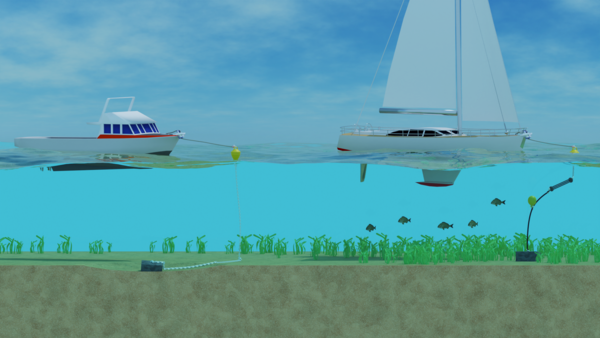Environmentally Friendly Mooring Research Program
Project overview
Transport for NSW is collaborating with the CSIRO to investigate, design and evaluate different types of environmentally friendly boat moorings to make sure they are safe and dependable, and they protect sensitive marine habitat such as seagrass.

Program information
Background
The Environmentally Friendly Mooring Research Program was established to reduce threats to seagrass. Seagrass is a valuable marine ecosystem that provides habitat and a food source for fish and other aquatic animals. Seagrass also protects coastlines by helping to reduce erosion and it improves water quality.
Traditional chain moorings use a concrete block, or heavy weights, on the seabed attached to a thick chain, ropes, and a buoy to hold a vessel in position under a range of weather conditions. When a moored vessel swings around the mooring with the wind, waves and currents, the heavy chain can scrape or scour the seafloor and seagrass.
To reduce this impact, Transport for NSW is collaborating with the CSIRO to deliver the Environmentally Friendly Mooring Research Program. The program addresses knowledge gaps by testing and evaluating environmentally friendly mooring (EFM) designs through modelling and in-water trials for different vessel sizes, vessel types, environmental conditions and locations.
An environmentally friendly mooring is designed to minimise contact with the seafloor. These moorings generally replace the traditional heavy mooring chain with a flexible, buoyant mooring line, that has sufficient strength and elasticity to dampen the action of wind and waves on the vessel.
This collaborative research program involves evaluating both engineering and environmental performance of environmentally friendly moorings. Knowledge gained from this work will provide information which can be used to develop guidelines for the installation and maintenance of environmentally friendly moorings, as well as providing greater confidence in the long-term use of environmentally friendly moorings, instead of traditional moorings.
What is an environmentally friendly mooring?
An environmentally friendly mooring is designed to minimise contact with the seafloor. These moorings generally replace the traditional heavy mooring chain with a flexible, buoyant mooring line, that has sufficient strength and elasticity to dampen the action of wind and waves on the vessel.
What is happening now?
In 2023, the CSIRO and local mooring contractors deployed 12 environmentally friendly moorings in Port Stephens (Salamander Bay), Sydney Harbour (Balmoral), and Jervis Bay (Callala Bay).
The CSIRO is currently monitoring these moorings and measuring their engineering performance and environmental impact over two years.
Upon conclusion of the trial, both engineering and environmental recommendations will be reported and used to:
- develop performance guidelines for mooring design, installation, maintenance, lifecycle cost and safety
- demonstrate benefits to biodiversity, habitat restoration, seagrass recovery and carbon sequestration.
Project stages
The Environmentally Friendly Moorings Research Program is being delivered in stages.
Stage 1: completed in January 2022, undertook market due-diligence, published a literature review of environmentally friendly moorings, undertook stakeholder consultation, identified environmentally friendly moorings trial locations and selected environmentally friendly moorings designs for the in-water trial.
Stage 2: completed in March 2023, recruited 12 mooring owners to replace their traditional moorings with environmentally friendly moorings, prepared environmentally friendly moorings design specifications and sought planning approvals. Commenced seabed carbon and biodiversity sampling.
Stage 3: completed in August 2024, deployed 12 environmentally friendly moorings replacing traditional block and chain moorings at Port Stephens (Salamander Bay), Sydney Harbour (Balmoral), and Jervis Bay (Callala Bay). The environmentally friendly moorings included three different designs and attachment of sensors to monitor vessel performance. Environmentally friendly moorings servicing and maintenance was undertaken, as well as continued carbon and biodiversity sampling and analysis.
Stage 4: current stage, includes continued monitoring and evaluation of environmentally friendly moorings engineering and environmental performance over the 2-year in-water trial. Key outputs to include final engineering and environmental reporting, recommendations and communications to develop performance guidelines for mooring design and encourage the uptake of environmentally friendly moorings in NSW.
Literature review
Stage 1 of the research program concluded with completion of a Literature Review of Environmentally Friendly Moorings.
The scope of the Literature Review encompasses:
- reviewing environmentally friendly mooring assessment science
- evaluating the performance and market availability of different environmentally friendly mooring systems
- identifying and recommending environmentally friendly mooring designs for in-water trial.
Download the The CSIRO Literature Review of Environmentally Friendly Moorings: Environmental and Engineering Performance (PDF, 1.42 MB).
Contact us
For further information about this project, please contact:

